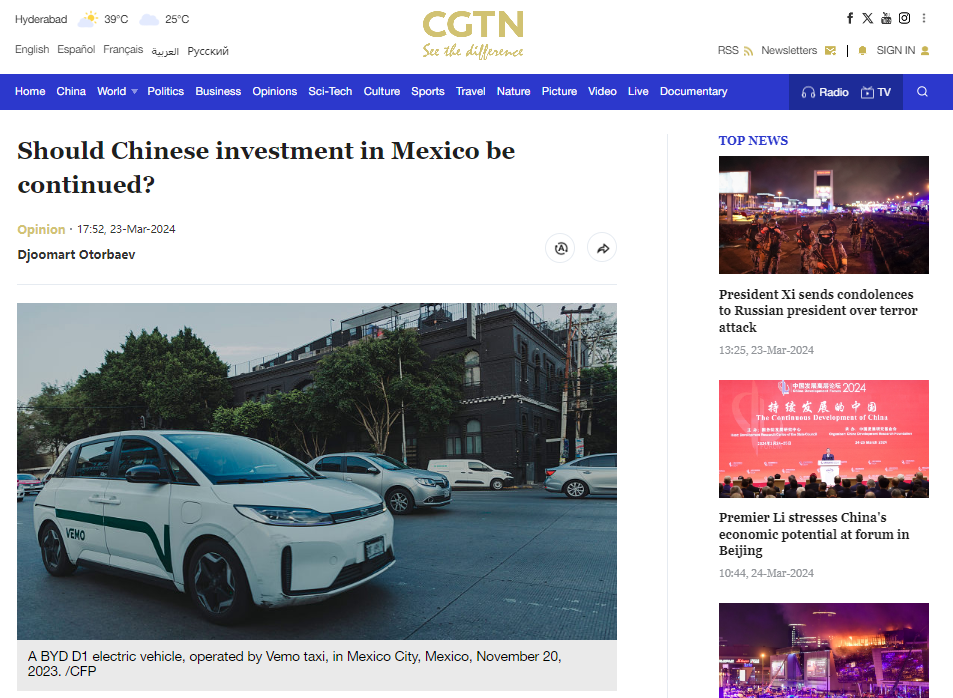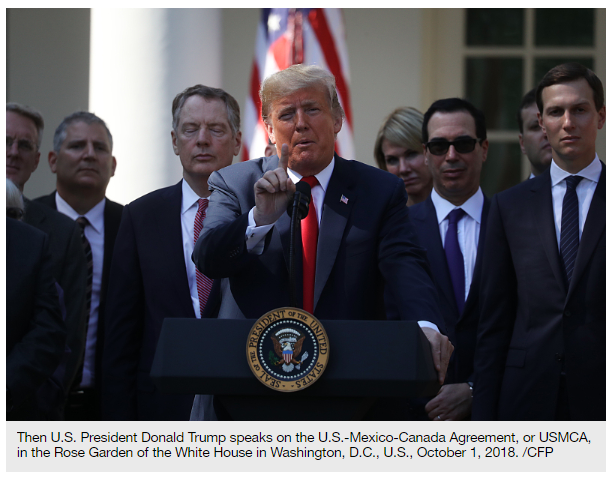LATEST INSIGHTS
Your Present Location: LATEST INSIGHTSDjoomart Otorbaev: Should Chinese investment in Mexico be continued?
Source: CGTN Published: 2024-03-23

Editor's note: Djoomart Otorbaev, a special commentator on current affairs for CGTN, is a former prime minister of the Kyrgyz Republic, a professor of the Belt and Road School of Beijing Normal University, a member of Nizami Ganjavi International Center, and the author of the book 'Central Asia's Economic Rebirth in the Shadow of the New Great Game'(Routledge, 2023). The article reflects the author's views and not necessarily those of CGTN.
Despite the slowdown in global trade, the trade relationship between China and Mexico continues to proliferate and may be the quickest-growing in the world. In January of this year, the demand for containers was up almost 60 percent as compared to the same period last year. Chinese investment continues to flow into Mexico as well, as evidenced by two significant events late last year.The government of Nuevo Leon, located in the northern region of Mexico and shares a border with the U.S, announced that Lingong Machinery Group, a Chinese company that manufactures construction equipment such as excavators, would be constructing a $5 billion plant in the state. Meanwhile, Trina Solar, a solar panel company, intends to invest up to $1 billion in the same state.
China's investments have proven beneficial to Mexico's exporters, with Mexico surpassing China as the top exporter of goods to the U.S. in September of last year, a position it had not held in about two decades.
Chinese investors are particularly drawn to the country because of its large market, lower labor costs, and availability of a skilled workforce. Additionally, Mexico's proximity to the U.S. means that manufacturers have a logistical advantage in serving the American market. Many believe that Chinese companies are interested in Mexico to bypass sanctions. However, as we show in this piece, this is unlikely to be the case.
Mexico has become a significant player in the automobile industry, ranking as the world's seventh-largest auto-producing country. As a result, it has become a lucrative market for car manufacturers. In recent years, Chinese automakers have seen significant growth here, with their sales now accounting for almost 20 percent of the total sales in Mexico. This is a considerable increase compared to virtually zero sales six years ago.
Towards the end of last year, reports emerged that Washington had raised additional concerns with Mexico over a surge of investment from China, as several of China's most significant electric vehicle (EV) manufacturers were exploring the possibility of building factories south of the U.S. border. Manufacturers such as MG, BYD, and Chery were reportedly discussing how to determine suitable locations for their production facilities with Mexican officials. Simultaneously, another Chinese company announced plans to construct a $12 billion battery plant in Mexico, according to the Financial Times . Mexican officials have acknowledged the necessity of being cautious when evaluating proposals for Chinese investment, owing to the risk of possible backlash from Washington.

Mexico is part of the U.S.-Mexico-Canada Agreement, which allows for free trade of products between the three countries. However, the U.S. has restricted specific electrical components produced by Chinese companies under the Inflation Reduction Act. These restrictions include EVs, batteries, and other high-tech electrical components.
The increasing Chinese influence in Mexico is also causing concern among U.S. lawmakers. In a recent letter addressed to the U.S. Trade Representative Katherine Tai, four Congress members cautioned that Chinese automakers in Mexico are attempting to exploit 'preferential access to the U.S. market through our free trade agreements and bypass any [China-specific] tariffs.'
It is important to note that if political tensions continue to escalate, the winner of this year's election may take additional measures to restrict imports from Mexico. These measures could include implementing strict regulations such as the requirement to increase non-tariff barriers, demand traceability of origin, enforce monitoring of human rights or labor violations, or introduce special rules for strategic industries. Furthermore, there is a possibility of introducing more difficult customs procedures.
It appears that Chinese auto companies that export cars to Mexico are aware of the tactics employed by American politicians and, thus, focus mainly on the local market. For example, Stella Li, CEO of BYD Americas, said the company is exploring options for opening a plant in Mexico with an annual production capacity of 150,000 vehicles and hopes to decide by the end of this year. She also reiterated that BYD has no interest in the U.S. market and is not considering border states for plant locations.
In American politics, both Democrats and Republicans consider Chinese imports a 'threat to national security.' As a result, the debate on trade restrictions on Chinese goods will likely intensify before the upcoming U.S. election. Many believe protectionist policies will not be relaxed in the coming years.
However, any investments in the Mexican economy have significant potential for further exports to the Latin American market. Chinese companies are gaining experience and creating jobs in those markets. For instance, trade with China generated 6.8 million jobs in Latin America between 1995 and 2021, which is more than the 6.7 million jobs created by interactions with the U.S. The pressure from the American government will not be a disaster for Chinese manufacturers in Latin America.
Key Words: Djoomart Otorbaev, Investment, Mexico, BYD























































































 京公网安备 11010802037854号
京公网安备 11010802037854号





